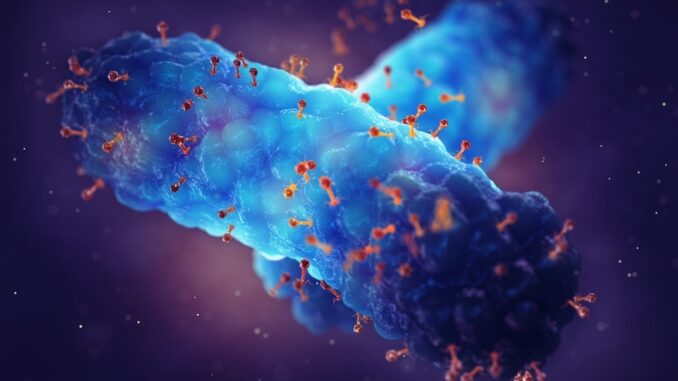
For the first time, scientists have designed a phage combination therapy that can precisely target and suppress gut bacteria associated with inflammatory bowel diseases (IBD). Presented on August 4 in the journal Cell, the work showcases the possibility of using phages for treating diseases associated with gut microbiota.
“The biggest problem with applying phage therapies is that there is a constant arms race between bacteria and phages,”
says Eran Elinav, director of the Systems Immunology department, Weizmann Institute of Science and the Microbiome & Cancer Division, German National Cancer Center (DKFZ) and the corresponding author of the study.
“If you apply a single phage on a bacterium, the bacterium would likely develop resistance mechanisms very rapidly. To our knowledge, we are the first to use an orally-administered phage combination therapy against a disease-contributing gut commensal, while tackling the huge issue of phage resistance and treating a non-communicable disease.”
IBD includes a group of chronic inflammatory disorders of the gut that affect millions of people in the world. While the cause of IBD remains unclear, previous research has suggested that certain bacteria in the gut are linked to the disease. Researchers have tried using antibiotics to treat IBD, but these therapies are not sufficiently specific or effective. Antibiotics kill the friendly gut bacteria along with the pathogenic ones, can cause adverse effects, and give rise to antibiotic-resistant bacteria.
“This proof-of-concept study utilizes phages as a precision weapon in suppressing a group of commensal strains contributing to IBD,” says Elinav. “But our vision is that this new modality could potentially be developed and applied against a number of other IBD-associated bugs, and also against commensals that are involved with other diseases, including obesity, diabetes, cancer, neurodegenerative diseases, and more.”
Elinav’s team, in collaboration with a group of international scientists, and the Weizmann Institute of Science’s spinoff phage therapy company BiomX Ltd compared the gut microbiota compositions of 537 IBD patients to healthy controls enrolled in cohort studies in France, Israel, the U.S., and Germany. The team found IBD patients, despite their differences in geography, ethnicity and diet, tend to have a group of Klebsiella pneumoniae (Kp) strains enriched in their gut, especially in those who are experiencing disease flare-ups. When transplanting the Kp into mice, the team found that mice developed a severe intestinal inflammation and tissue damage, suggesting that these Kp strains may contribute to worsening of IBD.
Next, Elinav and his team scanned and isolated thousands of bacteriophages from environmental samples. Bacteriophages are viruses that can target and infect bacteria. They identified some 40 phages that appear to be effective against the IBD-contributing Kp strains, including strains that have already developed phage resistance.
The team tested the phages in various groups as a potential cocktail treatment against IBD-contributing Kp strains. In these phage combinations, each of the phages uses a different receptor to enter bacteria, and kills them through different mechanisms. Even if the bacteria mutate, rendering one of their receptors resistant, there will be back-ups, Elinav says. An effective cocktail design can prevent phage-resistant bacteria from forming and spreading, he adds.
Elinav and his team discovered the most effective phage combination, which contains five phages, in suppressing the Kp strains in the test tube, as well as in mice IBD models, where the phage cocktail attenuated inflammation and tissue damage.
The team further tested two representative phages from this cocktail in a phase I clinical trial that involves 18 healthy volunteers. The experiment showed that the phages can survive at high levels and remain active throughout the gastrointestinal tract when taken with antacids while not impacting the surrounding microbiota. Participants had no severe treatment-related adverse events. The team plans to further test the 5-phage cocktail in a subsequent phase II trial encompassing IBD patients that harbor the disease-contributing Kp strains. In addition, Elinav and his team are working to identify bacteria associated with other diseases and to develop effective phage combination therapies against them.
“What we envision is a precision medical pipeline,” says Elinav. “Using it, we can characterize the pathogenic bacteria of a person suffering from a disease related to the gut microbiota, and then apply a phage therapy that would be tailored to the individual to suppress the bacteria.”

